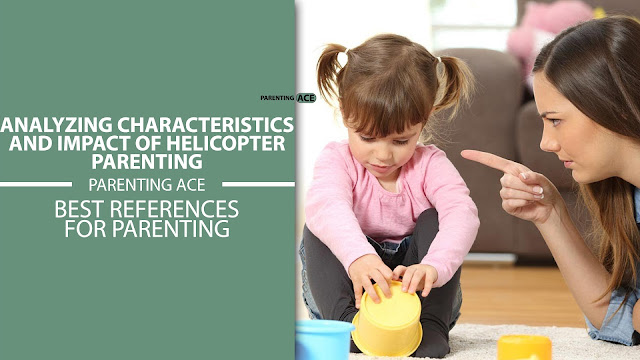Understanding the Characteristics of Helicopter Parenting: A Comprehensive Analysis
Welcome to our exploration of helicopter parenting: a phenomenon that has captivated the attention of parents, educators, and psychologists alike. In this blog post, we delve into the intricate characteristics of helicopter parents, dissecting their tendencies towards overprotection, micromanagement, and anxiety-driven behaviors. Join us as we unravel the complexities of this parenting style and examine its profound impact on children's development and well-being.
 |
| Analyzing Characteristics And Impact Of Helicopter Parenting |
What Are The Characteristics Of Helicopter Parents?
In the intricate landscape of parenting, various styles and approaches emerge, each leaving a distinct imprint on children's development. One such phenomenon that has garnered significant attention in recent years is helicopter parenting. This style of parenting, marked by excessive hovering and overinvolvement in a child's life, has sparked debates among psychologists, educators, and parents alike. In this article, we delve into the characteristics of helicopter parents, exploring their behaviors, motivations, and the impact they have on children's well-being.
Characteristics of Helicopter Parents:
1. Overprotectiveness
Helicopter parents exhibit an excessive need to shield their children from any form of harm, real or perceived. They are hyper-vigilant about potential dangers, leading them to closely monitor and control their child's activities, both in physical and virtual spaces. This overprotectiveness often stems from a deep-seated fear of their child experiencing failure or disappointment.
2. Micromanagement
One defining trait of helicopter parents is their tendency to micromanage every aspect of their child's life. From academics to extracurricular activities and social interactions, they feel compelled to intervene and orchestrate every detail to ensure their child's success and happiness. This micromanagement can stifle a child's autonomy and hinder their ability to develop problem-solving skills and independence.
3. High Levels of Anxiety
Helicopter parents are frequently driven by anxiety and fear, constantly worrying about their child's well-being and future prospects. This anxiety manifests in behaviors such as incessant checking-in, intrusive questioning, and an inability to trust their child to handle challenges independently. While their intentions may be rooted in love and concern, this heightened anxiety can create an atmosphere of pressure and stress for both parent and child.
4. Lack of Boundaries
Another hallmark of helicopter parenting is the blurring of boundaries between parent and child. Helicopter parents often struggle to distinguish between their own needs and desires and those of their child, leading to enmeshed relationships where the child's identity becomes intertwined with that of the parent. This lack of boundaries can impede the child's development of a strong sense of self and autonomy.
5. Avoidance of Failure
Helicopter parents go to great lengths to shield their children from failure, often resorting to excessive praise, rescuing them from challenging situations, or even intervening to manipulate outcomes in their favor. However, this avoidance of failure deprives children of valuable learning experiences and resilience-building opportunities essential for their growth and development.
Impact of Helicopter Parenting
The effects of helicopter parenting on children can be far-reaching and complex. While some children may initially benefit from the attention and support provided by helicopter parents, many ultimately struggle to develop essential life skills, such as problem-solving, decision-making, and self-regulation. Additionally, the constant pressure to meet their parents' expectations can lead to feelings of inadequacy, anxiety, and a fear of taking risks.
In conclusion, helicopter parenting is characterized by overprotectiveness, micromanagement, high levels of anxiety, lack of boundaries, and avoidance of failure. While helicopter parents may have the best intentions, their behaviors can have detrimental effects on children's development, hindering their ability to thrive independently and navigate life's challenges. As parents, finding a balance between providing support and allowing children the freedom to learn and grow is essential for fostering resilience, autonomy, and well-being.



Comments
Post a Comment